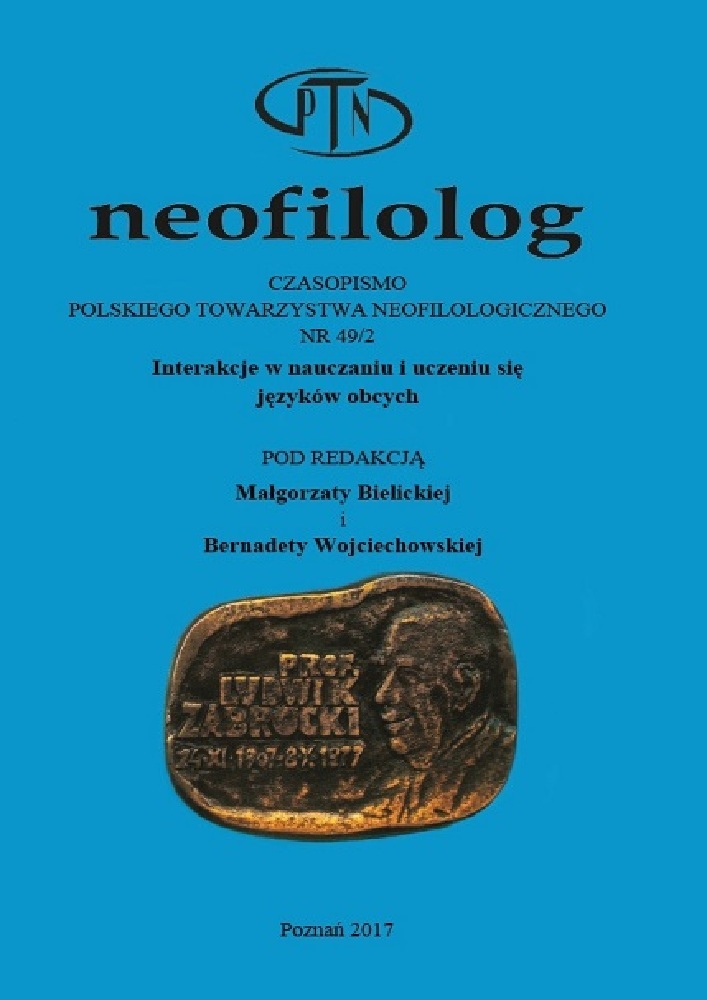Résumé
The contemporary learning culture perceives learners as active and aware participants in the learning process. This implies a new understanding of interactions in the classroom. The present paper is focused on feedback as a special type of teacher-learner interaction and its potential for cognitive activation of learners and constructive enhancement of individual learning processes. Feedback which activates learners and increases the amount of the input and output in the foreign language is able to enhance students` communicative language competence. The article discusses the changing role of feedback referring to the current state of research.Références
Arnold, R., Schüßler, I. 1998. Wandel der Lernkulturen. Ideen und Bausteine für ein lebendiges Lernen. Darmstadt: Wissenschaftliche Buchgesellschaft.
Coste, D., North, B., Sheils, J., Trim, J. 2001. Gemeinsamer europäischer Referenzrahmen für Sprachen: Lernen, lehren, beurteilen. http://www.goethe.de/Z/50/commeuro/i2.htm [DW = 15.03.2017]
De Corte, E. 2013. „Historyczny rozwój myślenia o uczeniu się”. (in) Istota uczenia się. Wykorzystanie wyników badań w praktyce. (Hrsg. H. Dumont, , D. Istance, F. Benavides,), Warszawa: Wolters Kluwers Polska S.A., S. 60-108
Dörnyei, Z. 2001. Motivational strategies in the language classroom. Cambridge: Cambridge University Press.
Edmondson, W., House, J. 2003. „Interaktionen beim Lehren und Lernen fremder Sprachen“. (in) Handbuch Fremdsprachenunterricht (Hrsg. K.-R., Bausch, H. Christ, H. J. Krumm). Tübingen und Basel: A. Francke Verlag, S. 242-247.
Gass, S. 2003. „Input and interaction”. (in) The handbook of second language acquisition. (Hrsg. Doughty, C. J., Long, M. H.).Malden: Blackwell Publishing, S. 225-255.
Gold, A. 2015. Guter Unterricht. Was wir wirklich darüber wissen. Göttingen: Vandenhoeck & Ruprecht.
Hattie, J. 2015. Widoczne uczenie się dla nauczycieli. Jak maksymalizować siłę oddziaływania na uczenie się. Warszawa: Centrum Edukacji Obywatelskiej.
Hattie, J., Timperley, H. 2007. „The power of feedback”. Review of Educational Research 1(77): 81-112. https://ctl.univie.ac.at/fileadmin/user_upload/z_ctl/Feedback/Hattie_Timperley_2007_Power_of_Feedback_1_.pdf [DW = 18.03.2017]
Helmke, T., Helmke, A., Schrader, F.-W., Wagner, W., Nold, G., Schröder, K. 2008. „Die Videostudie des Englischunterrichts“. (in) DESI-Konsortium. Unterricht und Kompetenzerwerb in Deutsch und Englisch. Ergebnisse der DESI-Studie. Weinheim und Basel: Beltz Verlag. S. 345-363. http://www.pedocs.de/volltexte/2013/3521/pdf/Helmke_Helmke_Schrader_Videostudie_2008.pdf [DW = 15.03.2017]
Hüther, G. 2016. Mit Freude lernen ein Leben lang. Göttingen: Vandenhoeck & Ruprecht.
Janicka, M. 2013. „Preferencje dotyczące korekty błędów językowych w wypowiedziach ustnych na tle dyskursu pedagogicznego w klasie językowej”. (in) Rola dyskursu edukacyjnego w uczeniu się i nauczaniu języka obcego. (Hrsg. M. Pawlak), Kalisz – Poznań: Wydział Pedagogiczno-Artystyczny UAM, Uniwersytet A. Mickiewicza. S. 261-281.
Kleppin, K. 2000. Fehler und Fehlerkorrektur. Berlin, München, Leipzig, Wien, Zürich, New York: Langenscheidt.
Königs, F. 2003. „Fehlerkorrektur“. (in) Handbuch Fremdsprachenunterricht. (Hrsg.) K.-R. Bausch, , H. Christ, H.-J. Krumm, Tübingen und Basel: A. Francke Verlag, S. 377-382.
Majer, J. 2003. Interactive discourse in the foreign language classroom. Łódź: Wydawnictwo Uniwersytetu Łódzkiego.
Marzec-Stawiarska, M. 2013. „Analiza lęku przed mówieniem w języku obcym jako element odpowiedniego zarządzania dyskursem w klasie”. (in) Rola dyskursu edukacyjnego w uczeniu się i nauczaniu języka obcego. (Hrsg. M. Pawlak), Kalisz – Poznań: Wydział Pedagogiczno-Artystyczny UAM, Uniwersytet A. Mickiewicza. S. 47-68.
Reich, K. 2004. Konstruktivistische Didaktik. Lehren und Lernen aus interaktionistischer Sicht. München/ Unterschleißheim: Luchterhand.
Język angielski w gimnazjum. Raport cząstkowy z pierwszego etapu Badania uczenia się i nauczania języka angielskiego w gimnazjum. 2014. Warszawa: Instytut Badań Edukacyjnych.
http://eduentuzjasci.pl/badania/110-badanie/572.html [DW = 18.03.2017]
Siebert, H. 2005. Pädagogischer Konstruktivismus. Lernzentrierte Pädagogik in Schule und Erwachsenenbildung. Weinheim und Basel: Beltz Verlag.
Volkwein, K. 2012. „Sich wechselseitig bewerten“. Pädagogik 2/12: 20-23.
Licence
© Monika Janicka 2017

Ce travail est disponible sous licence Creative Commons Attribution - Pas de Modification 4.0 International.
Auteurs :
Les auteurs de textes acceptés pour publication dans la revue Neofilolog sont tenus de remplir, signer et renvoyer à l'adresse de la rédaction, un accord sur l'octroi d'une licence gratuite pour les œuvres, avec obligation d'accorder une sous-licence CC.
En vertu de cet accord, les auteurs des textes publiés dans la revue Neofilolog accordent à l'Université Adam Mickiewicz de Poznań une licence non exclusive et gratuite et permettent l'utilisation de la sous-licence Creative Commons Attribution-NoDerivatives 4.0 International (CC BY-ND 4.0).
Les auteurs se réservent le droit de disposer librement de l'œuvre.
Utilisateurs :
Les utilisateurs d'Internet intéressés ont le droit d'utiliser les œuvres publiées à partir de l'année 2017 sous réserve des conditions suivantes :
- reconnaissance de la qualité d'auteur - l'obligation de fournir des informations sur la qualité d'auteur, le titre, la source (liens vers l'œuvre originale, DOI) et la licence, ainsi que l'œuvre distribuée ;
- sans créer d'œuvres dérivées - l'œuvre doit être conservée dans sa forme originale, p. ex. les traductions ou les interprétations ne peuvent être distribuées sans le consentement de l'auteur.
Tous les textes publiés sont soumis au droit d'auteur.
Autres :
L'Université Adam Mickiewicz de Poznań se réserve le droit à la revue dans son ensemble (mise en page, forme graphique, titre, conception de la couverture, logo, etc.).
.
